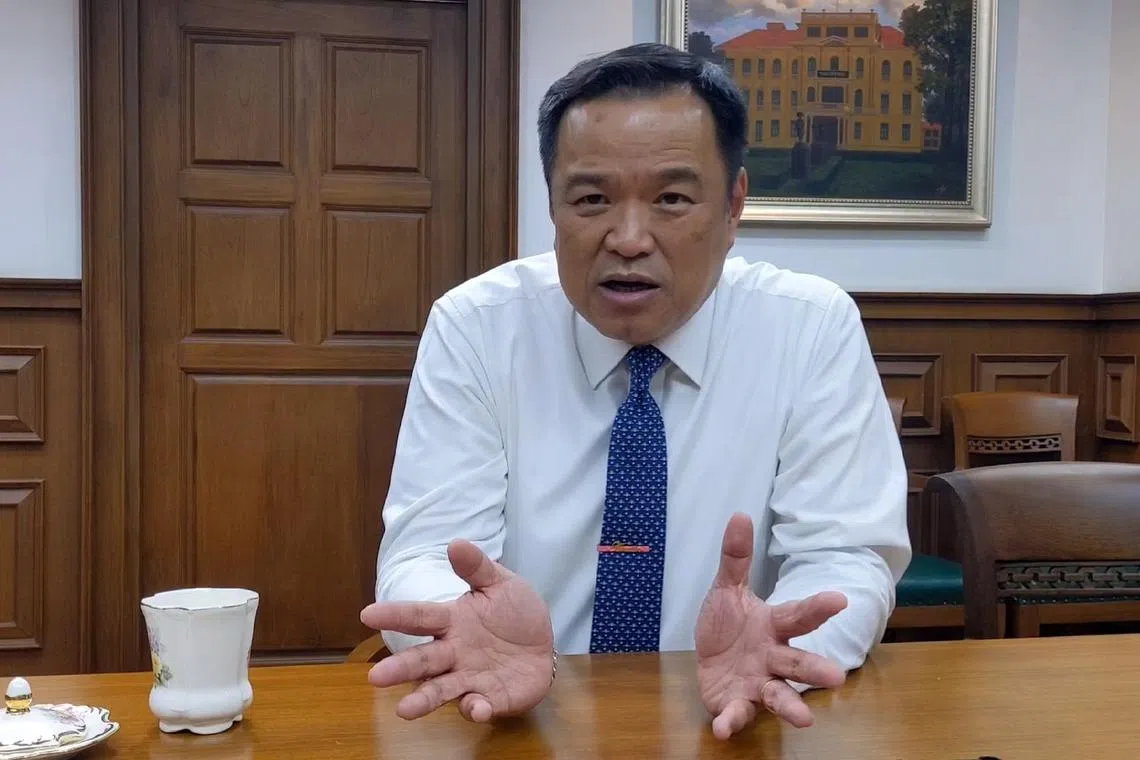Thai politicians jump ship to join pro-cannabis party, boosting its lead in election race
Sign up now: Get ST's newsletters delivered to your inbox

The Bhumjaithai Party has grown in size and clout over the years.
PHOTO: KHONBHUMJAITHAI/TWITTER
Follow topic:
BANGKOK -Thailand’s game of political musical chairs is under way following the exodus of nearly 40 politicians to the Bhumjaithai Party on Dec 16, with plenty more twists and turns to come before the election which is due in May 2023.
With the mass defections from both affiliate and opposing camps to Bhumjaithai – widely known for its cannabis liberalisation policy – the party is now in a strong position to potentially form the backbone of the next ruling coalition.
The political arena is becoming “somewhat” clearer, said analysts, as the looming polls look set to be a race to the top between the main opposition party, Pheu Thai, and Bhumjaithai.
“Between them, it will be a race to see who can collect the most number of political backings to form a coalition,” said political analyst Punchada Sirivunnabood.
Pheu Thai, which is closely associated with former prime minister Thaksin Shinawatra, is gunning for a “landslide victory”. To achieve this, it has launched populist election promises, including a vow to lift minimum wages and reduce energy costs.
Meanwhile, Bhumjaithai has grown in size and clout over the years. It had 51 MPs after the 2019 election, and is now the second-largest party in the ruling coalition with 62 MPs.
While its push for cannabis liberalisation that it campaigned for in the 2019
On June 9, cannabis was delisted as a drug in Thailand, has yet to be approved by Parliament.
Analysts say that Bhumjaithai is on relatively good terms with key groups, including influential elites, wealthy businessmen, and high-ranking military leaders, and its growing clout will only make it more attractive to politicians from other factions.
This also certainly boosts Bhumjaithai leader Anutin Charnvirakul’s chance of becoming premier, which will be determined by a parliamentary vote involving elected MPs and the military-backed senate, said Professor Wanwichit.
He said that Bhumjaithai is emerging as the best option among the conservative parties, like the pro-military Palang Pracharath Party (PPRP) which currently leads the ruling coalition.

being on good terms with key groups boosts Bhumjaithai leader Anutin Charnvirakul’s chance of becoming premier.
PHOTO: ST FILE
Plagued by in-fighting, the PPRP, which was set up as a political vehicle to nominate former coup-leader Prayut Chan-o-cha as premier in the 2019 election, has waned in stature and popularity. The number of MPs in its ranks has decreased from 116 to about 80, and analysts expect more MPs to defect.
“The PPRP might not lead the coalition, but it will most likely still continue to be part of the government,” said Dr Punchada, adding that it still has some influential candidates such as its leader Prawit Wongsuwan.
However, it is unclear whether Prime Minister Prayut, who was successfully backed by the PPRP for the premiership in the 2019 election, will remain committed to the party.
Despite their long-standing ties, political disagreements between Mr Prawit and Mr Prayut of late have fuelled speculation that the PM could soon join Ruam Thai Sang Chart, a party set up by his supporters to help him retain his post in the next election.
Responses by both men, though cagey, indicate that a move is imminent, with Mr Prawit’s most direct remarks to Thai media being: “It would seem that the prime minister will go. He is likely to go.”
According to PPRP’s deputy leader Paiboon Nititawan, the party is contemplating nominating Mr Prawit as its sole candidate for prime minister, signalling that it has moved on from its earlier support of Mr Prayut for the post.
However, the recent spate of political defections could have bearing on the current Parliament, which prior to this has failed to meet quorum on multiple occasions since it was convened in 2019. This has resulted in a delay of multiple draft laws, including those on cannabis use.
According to the law, MPs must resign from Parliament, before they can join a new party. As there are fewer than 180 days before the end of the current House’s term in March 2023, by-elections need not be held.
Many more MPs are expected to resign to join rival and affiliate political parties that could cripple Parliament as it still has about 20 important draft laws pending.
There is also talk that this could trigger an early dissolution, which will pave the way for the election.
But Dr Punchada does not think that Mr Prayut, who has the power to dissolve the House with royal approval, will do so until it gets closer to the end of term.
“I don’t think there is concern over Parliament’s stability. He will not dissolve Parliament... as he can still use his position to support his political campaign,” she said.



